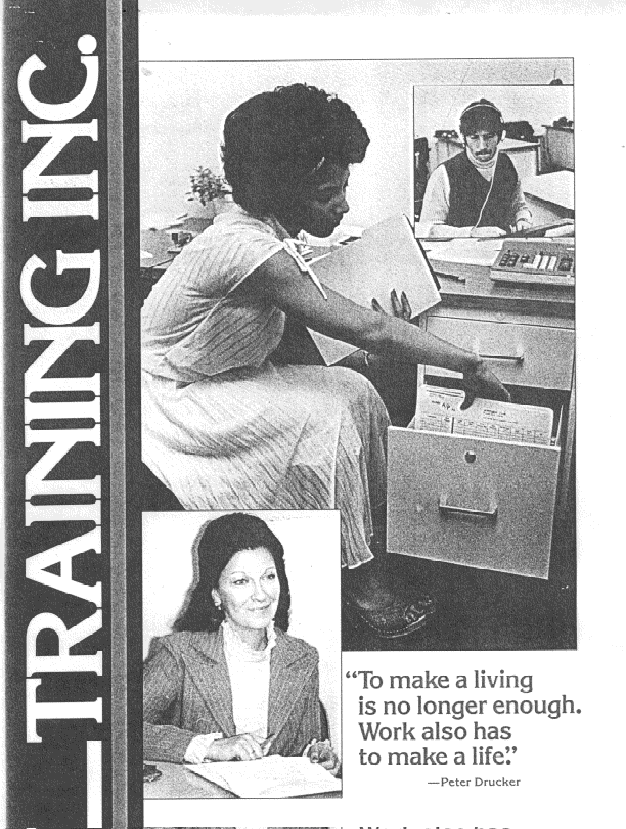
 |
Who we are and what we do
Training, Inc. is a highly effective and innovative clerical training program which has been developed through the cooperation of local businesses, higher education, and local government.
Now in its fifth year, Training, Inc. is enthusiastically supported by its sponsors in Oak Brook and Chicago: In Oak Brook, the DuPage County Employment and Training Office provides CETA operating funds; Central YMCA Community College is the training agency that implements the program; and the Oak Brook Association of Commerce and Industry is the group of cooperating business firms that advise and support the program and hire its graduates. In Chicago, this program is supported by the Mayor's Office of Employment and Training, the Central YMCA Community College and Chicago United, a consortium of leading black, white and Latino business and professional people.
The Oak Brook training site is a simulated modern office located in the Butterfield Office Plaza Building. Students working and learning in the midst of an operating business setting experience themselves going to work rather than to class. Building on four years of successful employer tested experience, a second training site, also located in the mainstream of business, was established in December, 1978, in downtown Chicago's SunTimes Building.
The program is designed to build selfconfidence through achievement in the learning situation. This confidence shows in the graduates' interaction with employers, fellow workers and the public they serve directly or indirectly. Pride in accomplishment has implications beyond the accomplishment itself; it relates to the life purpose that accomplishment fulfills.
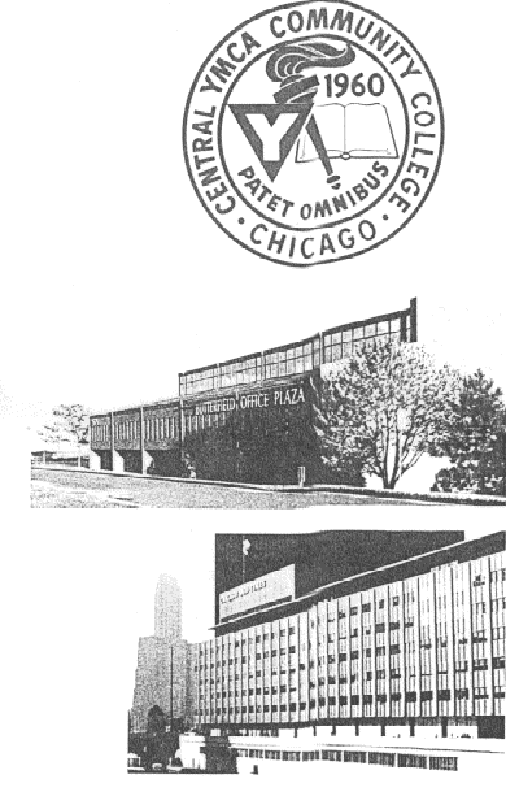 |
Robert McGregor, President, Chicago United:
T he rapid and accelerating rate of technological change in the workplace makes it more essential than ever that those entering the labor force today be prepared for the work and be adaptable to the changing job requirements. It is because of the needs in our business community today that Training, Inc. was set up.
"This program of studies produces ... welltrained and confident workers who are armed with solid business and office skills.
"What is more, the skills im parted by Training, Inc. are not only marketable, they are bans feeble. The training received can easily be adapted.
1-
, ~_ _
"The company or agency wants employees who are peopleoriented as well as workoriented, those who can create a spirit of cooperation and understanding with coworkers and clients alike. They depend on workers who can establish priorities and who possess the ability to make good and logical decisions:'
The students" comments
"I feel that Training, Inc. made me reliable because you had to be there to learn what the next step was . . .
"My level of awareness was enhanced, beyond my own belief. I became more aware of things inside of myself-my faults, negative feelings, positive thoughts, and skills:'
"I have also learned the importance of being punctual and appropriately dressed during office hours:'
"I got new insights into the business world, how to work with other people, and a new look as to how my smiles and productive work give a client a feel of easiness when doing business with us:'
"I've made up my mind, to let nothing stand in the way of accomplishing something worthwhile out of my life"
"I have learned to deal with all types of people and their various personalities:'
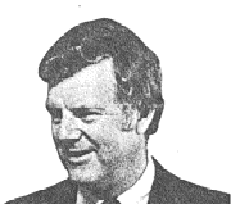 |
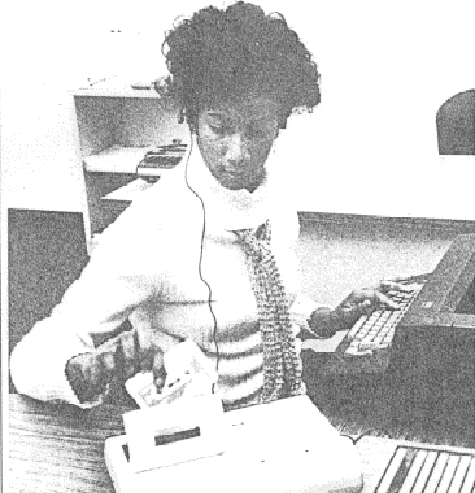 |
The difference between getting ahead and just getting by
What it means to the employer and the employee
T raining, Inc. is a clerical skills training program In which students learn by doing. The simulated business office provides a setting for students to assume responsible work roles. They learn clerical accounting, office procedures, and typing skills through the performance of business tasks under the guidance of instructors who have worked successfully in business themselves. In addition to teaching office skills. the curriculum deals with the student's selfimage. Trainees are enabled to understand and exemplify in their own lives the basic character traits and attitudes valued in the business world as necessary for success on the job. The effectiveness of this approach is documented by the program's consistent graduation rate of 97 percent.
Training, Inc. focuses on the individual's total employability. Proficiency in clerical skills is extremely important-but so are intangible elements such as confidence, pride in one's work, the ability to be a problem solver, and ethical action in business relationships.
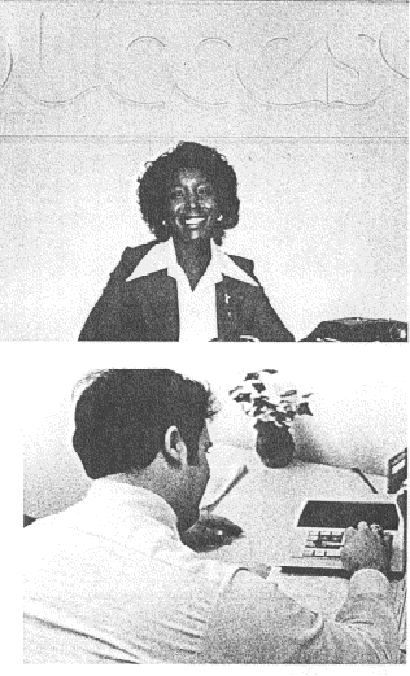 |
I The need for skills to realize total employability is exemplified by one woman who came to Training, Inc. with excellent typing ability and good office experience. Her skills were already marketable, but as she put it herself, "I just didn't believe I could make it after ten years of being a housewife and recently divorced. My selfconfidence was at an all time low. I desperately needed this time to make a transition. I completed the course with a whole new image of myself and my capabilities:'
Often the opportunity to think through a longrange employment goal is a key motivating factor to the Training, Inc. participants. It allows each new job to be seen as an important step along an individual's career path. With this perspective even a relatively routine, entrylevel job is taken seriously. The employers of Training, Inc. graduates discover their employees not only skillfully perform a wide variety of office duties but also demonstrate a professional business style.
There are a variety of jobs for which graduates might qualify. Those seeking their first office employment will aim for an entry level position. Others who already possess considerable work experience return to positions such as secretary, administrative assistant, or accounting clerk.
Companies seeking to fulfill affirmative action requirements have found Training, Inc. a valuable source of competent, welltrained employment candidates who know the difference between "getting ahead and just getting by"
"All the students have learned typing, calculator, accounting, math, English and punctuation, but most of all the course teaches confidence and pride in yourself, understanding of others, and the great desire to do the best you can. Never in my life have I wanted to prove myself more"
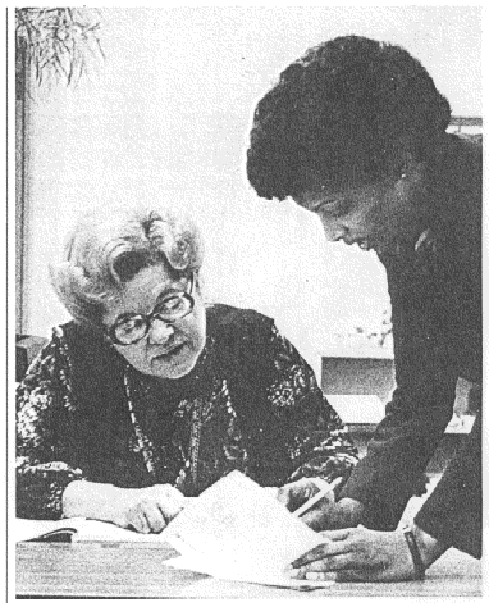 |
Three months at Training, Inc.
_
A Tested and Proven Curriculum
The Training, Inc. curriculum is focused on providing employment skills in four genera areas: 1 General office procedures 2 Basic bookkeeping and ~ _
accounting functions 3 Typing speed and production 4 Career development
Skills development occurs as a series of accomplishments which reinforce growing trainee self-confidence. Basic skills are supported by other critical elements in the curriculum: Business English and Mathematics; Job Seeking and Interview Skills; and Business Ethics.
Office systems, work flow, patterns of work and employee interaction in a business setting are experienced through office simulation and a work responsibility environment. A variety of office simulation packets are used in each of the three major skills areas. Each is designed so that trainees learn by performing task~ comparable to those expected of employees on the job.
The General Office Procedures Curriculum is designed to relate typing and secretarial accounting skills with other facets of office work. Basic filing techniques, telephone courtesy and receptionist skills are developed.
The Accounting Clerk Curriculum includes use of the electronic calculator by touch, practice in keeping accurate, neat records for efficient management of business affairs and detailed records of income and expenses. Trainees learn how to establish a work schedule, budget their time, and prioritize tasks.
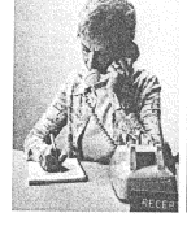 |
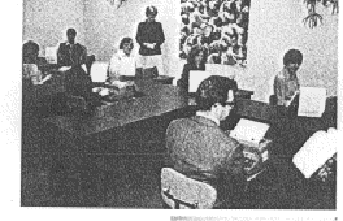 |
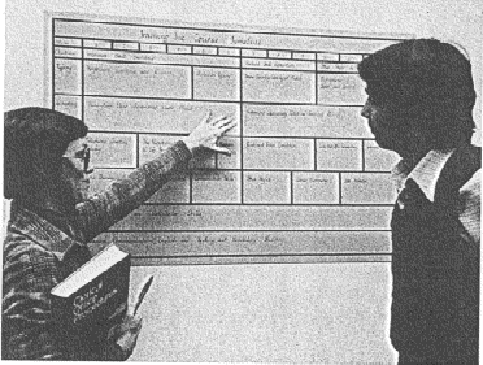 |
Participants can enter the Typing Curriculum at any level. Beginning typists are taught to operate the typewriter by touch and with correct typewriting techniques. They work on basic skills development and the ability to handle business letters and
forms.
The curriculum includes a refresher program for typists who have had prior instruction. This course emphasizes control and the ability to type from straight copy script, statistical copy and rough draft. A course in machine transcription provides advanced students with an opportunity to become proficient with a dictaphone.
The foundational skills of spelling, vocabulary, grammar, speech, composition and business math are integral to the whole program. These are taught in special review sessions and are reinforced in every course and learning situation.
The. Career Development Curriculum is taught throughout the program. Participants reflect on long and shortrange employment goals and study the procedures for filling out a job application. They create their own resumes, highlighting their most employable features. They prac- tice responding to typical questions asked during an interview and have at least one session each with a guest interviewer from the personnel department o! a large corporation.
Support skills that enable students to succeed on and survive on the job are also taught. Financial and time management skills are developed. Wardrobe and grooming are discussed with commercial fashion and beauty consultants. Business ethics and c business personality are a primary focus in this curriculum.
A program highlight is a twoweek total office simulation unit
called the Lester Hill Corporation, which integrates all components of the curriculum. The unit calls for each trainee to assume a position in one of the departments of the hypothetical Lester Hill Corporation. The simulation creates an awareness of the interrelated aspects of a business corporation and the importance of team work in getting the job done.
Once the main elements of the curriculum have been experienced, each trainee has the opportunity to experience several job interviews before the end of the program. Following each interview the trainee returns to the training site to reflect on the experiences and discuss how to improve the interviewing technique.
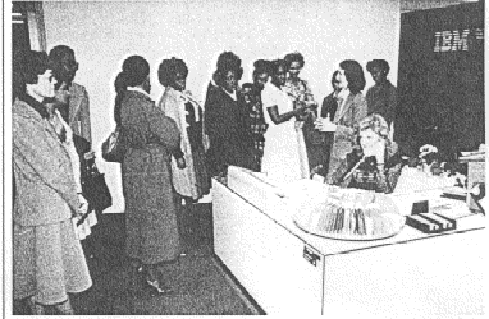 |
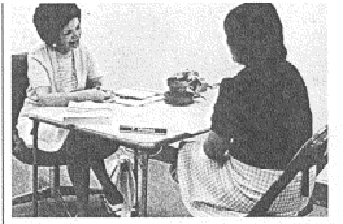 |
Success
Stories
When I first began my 12 weeks of clerical study at Training, Inc. I was a recent divorcee, a novice to the labor market and scared. I had worked many years before, but had no confidence in my ability to land a good job with promise of advancement. I enjoy people and wanted a position compatible with this aspect of my personality
At the end of my training period, I felt like a 'new woman' ... proud of my typing speed and confident in my ability to relate to people. I set Personnel or Public Relations as my goal, scanned the papers for positions available in these two areas and went 'full steam ahead' interviewing.
I applied for a job as secretary in a Personnel Department and got the job! Shortly more than a year later, I applied for another job with Personnel still my immediate goal and I was hired again; but this time as Assistant Personnel Manager!"
Phung Nguyen
"Training, Inc. offered me a chance to get a job even with limited English speaking ability:' Phung Nguyen came from Vietnam nearly five years ago. The Training, Inc. staff saw her ability and Official Airline Guides gave her the chance to prove herself by employing her as a clerk. After three years she was made Supervisor of her Department. English is still a challenge but according to Susan Doctors of Official Airline Guides, "she knows what she's doing and handles her responsibilities very well:'
 |
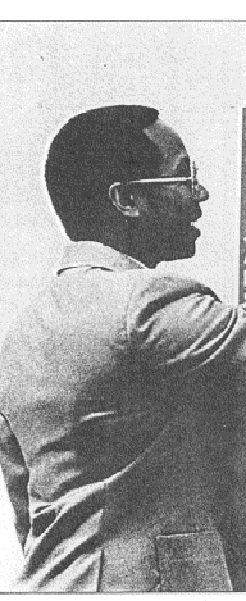 |
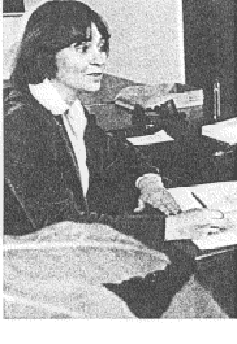 |
"Training, Inc. gave me a chance for a new career at Age 60:' ~
Connie De Stefano testified to the difference Training, Inc. has made in her life. "The program taught me to discipline my mind to listening, learning and retaining what I hear. In the orientation training program at Spiegels I received a 95.6% ranking. We were tested every day. I never had the pleasure of being anywhere near this score in my younger days! I owe my preparation to Training, Inc"
A chance to gain the confidence she needed
Kavita Malaviya, a young woman from India, had lived in the USA only six months when she enrolled in Training, Inc. She needed a way to adapt to American business style and modern office machinery and pro- cedures. After graduation in May, 1977, she was hired as general office clerk at Crown Life and is now accounting clerk, level 4 in the same company.
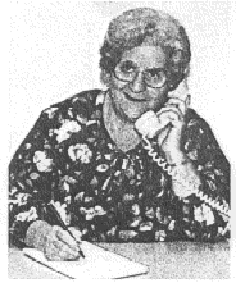 |
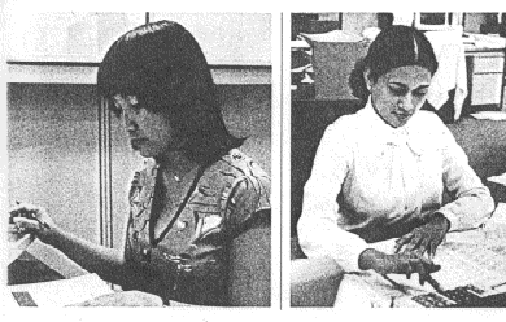 |
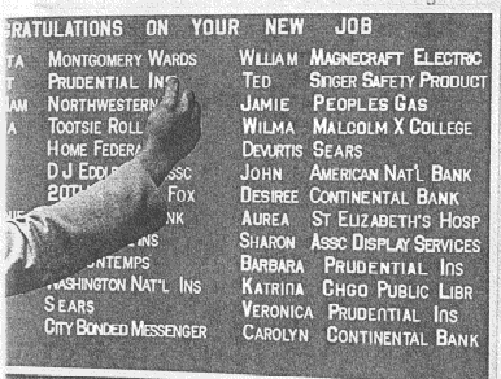 |
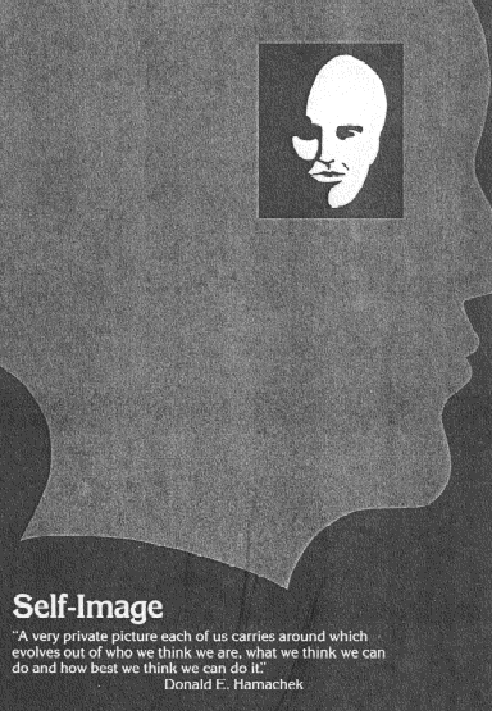 |
Imaginal Education
The methods employed in Training, Inc. are unique in the field of commercial training. The difference is based on the application of imaginal education. This approach to self image development is analogous to the "total person" concept employed in general education today, or the holistic philosophy of medicine and psychological counseling.
Developed by the staff of the Institute of Cultural Affairs, imaginal education is based on the assumption that when students effectively deal with basic operating images which have reinforced their lack of skill and uncertainty in employment relationships, they have met 90% of the challenge of career preparation.
"The objective of imaginal curriculum is to inspire the students to grasp themselves as capable performers of employment tasks which they can master. The program is structured to build self confidence through achievement. As students' images of their self worth, significance, and productivity develop, their practical business skills rapidly improve. The come to see the business world as a human and relevant context for creative participation:' (Carol Walters, Director, Training, Inc.)
Imaginal Education has allowed Training, Inc. to
deliver skills training and much more. The theoretical presuppositions
of the method are attributed to the work of Kenneth Boulding,
author of The Image: Life in Knowledge and Society: 1)
People operate out of images. 2) Images determine behavior. 3)
Images can change. 4) When images change, behavior
Human beings have a picture o! the world and themselves in relationship to the world which provides the context for their daily decisions. The successful business person usually operates out of a self image of relative competence and ability to perform needed tasks. Such images allow an individual to assume new assignments confidently direct personnel in getting a job done, and generally function effectively.
The prevailing image of the student entering Training, Inc. however, is most often, "l am unskilled and irrelevant to the business world. I just don t fit in" Such an image clearly undermines confidence in the ability to participate significantly and learn
During the educational process Training, Inc. students
continually receive "messages" that are aimed at producing
a positive self-image of competence, employability and self~sufficiency.
The attractive, modern office surroundings put the participants
at ease in a business setting. Their images of being out
~fplace are altered. As they learn to operate the electronic
calculator by touch again the image of inability is replaced by
one of competence. Through careful instruction they are enabled
to type a perfect letter, and possibility of a new self-image
as "qualified typist" emerges.
Carol Walters, Director Training, Inc. Program
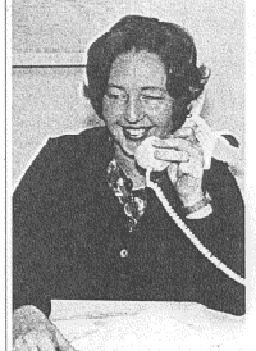 |
We teach what we are, not just what we say. We teach our own selfconcepts far more often than we teach our subject matter.
Is dedicated to seeing that every trainee wins.
The staff endeavors to educate the imagination. It concerns itself with the way people think, act, and organize themselves. It considers a trainee's whole life, including a long range plan, an understanding of self and a relationship to others and the world. Looking at barriers that prevent a student from being successful on the job and the ongoing support system that will sustain a working person are both grasped as necessary in predisposing the imagination toward success over the period of a lifetime.
~.'
Operates as a team. The staff has a single objective: to develop each individual's greatest potential for sustained employment. All members of the staff are familiar with the entire curriculum and are prepared to shift roles when necessary. Al members of the staff teach.
Are role models. It is well known fact that people learn more from what an instructor does than from what one says. Of chief importance is the effort put forth to create ways for students to learn when the traditional methods don t work.
Engages in regular planning an' evaluation. Brief daily meetings and more extensive weekly meetings provide occasions for structured interchange. A joint staff meeting between the Oak Brook and Chicago faculties is held on a regular basis to share reflections and update the curriculum.
Utilizes problem solving methods. When trainees can discern what blocks their career path, whether it is the way to pay next month's rent or the way to get to class or time, they are already on the way to a solution. The staff assists the students in naming the contradiction which consumes their attention and creating practical plans for resolving problems impeding career goals.
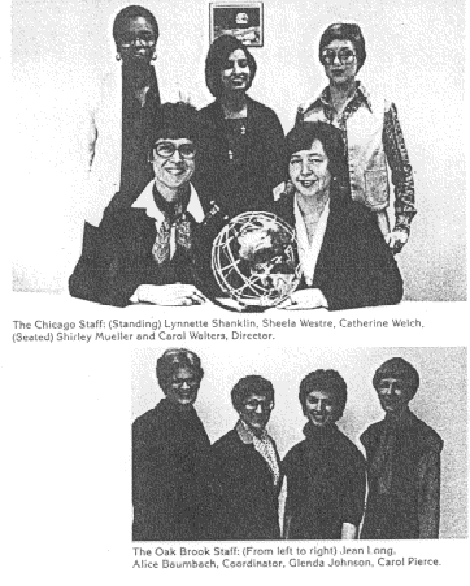 |
raining, Inc. has in 1979 effectively placed 90% of both Chicago and Oak Brook graduates. Ninetyseven percent of the students who enrolled, completed the program and graduated.
The staff has worked to document graduates' ability to retain jobs. A survey of graduates employed during 1979 indicated that 85% were still on the job.
An "Alumni Gathering" has been instituted to maintain contact with graduates and provide support to their career advancement. This event provided an opportunity for previous students to exchange success stories and share new insights gained from their work experiences.
Graduation is the grand finale for students at Training, Inc. In keeping with the practice of total identification with the business community, the graduation takes the form of a fine business luncheon.
Program sponsors and guests from many area firms are in attendance. A local corporation executive is invited to deliver the keynote address and welcome th~ students to their new positions in the working world.
A highlight of the event is the presentation of certificates. In addition to receiving this symbol of accomplishment and proficiency each graduate is charged with upholding a particular positive image that he or she has unique!) displayed during the training semester. In this way graduates leave Training, Inc. with clear images of the specific contribution each has to make to the business world.
"Thank you all for the new outlook on life. Graduation was so rewarding! I was proud of myself for the first time I can remember. Now I know I have the ability. Thanks once again!"
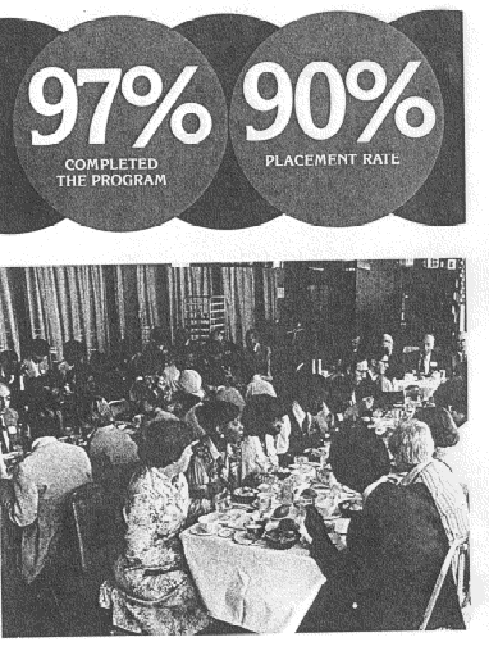 |
. We are proud to list those corporations and agencies whose con tributions and technical assistance have made the program possible. We particularly highlight those who continue to hire the students as well as the prime sponsors who in Chicago and Oakbrook
have provided the overall funding
Technical Assistance Contributors
Arthur Andersen Co.
Brown and Root, Inc.
CNA Insurance
'Holiday Inn Reservations .
IBM
Illinois Bell Telephone Co.
Inland Steel Corp.
Johnson's Products
Keebler Company
Mary Kay Products
McDonald's Corporation
'Montgomery Ward
Mutual Trust Life insurance Co.
Nalco Chemical Company
Norrell Services
Oak Brook Association of Commerce
and industry
Oak Brook Bank
Official Airline Guides
Peoples Gas, Light Coke Co.
Prudential Insurance Co.
Sears Roebuck and Company
Standard Oil of Indiana
Xerox Corporation
Financial Contributors
American Can Co.
Belden Corporation
Brown S Root, Inc.
Bunker Ramo Corp.
Chicago Bridge S Iron Co....''
Clow Corp
Commonwealth Edison
Enterprise Group, Inc.
FMC Corporation
Field Enterprises
First Federal Savings and Loan
Griffin Pipe Products Co.
Health Assessment Services, inc.
Hercules, Inc.
Illinois Bell Telephone Co.
Inland Steel Ryerson Foundation
Corporation
IneeHake Foundatiori
McBridge, Baker, Wienke, S Schiosser
McDonald's Corporation
Mutual Trust Life insurance Co.
Nalco Chem ical Company
Natural Gas Pipeline of America,
Northern Illinois Gas Co.
Oak Brook Association of Commerce and Industry Oak Brook Bank
Official Airlines Guides
Osco Drugs
Peoples Gas, Light S Coke Company
PerkinElmer Corporation
Polaroid Foundation
that makes the program possible.
Prudential Insurance Co.
Union Carbide
Waste Management, Inc.
Western Electric Company
Employers A Partial Listing of companies which
have employed Training, Inc. Graduates
American Can Co.
Arthur Andersen & Co.
Blue CrossBlue Shield
Borg Warner
Brown and Root, Inc.: :
Bunker Ramo :
Central YMCA Community College
Chicago Bridge and Iron
Chicago Housing Authority
CNA Insurance
Continental Illinois National
S Trust Co.
Continental Insurance Co.
D. J. Edleman, Inc.
Daubert Chemical
Dunn & Bradstreet
DuPage County
Elmhurst College
Elmhurst Hospital
Evergreen Plaza Bank
First National Bank
Follett Publishing Co..
Gallagher S Henry
Gary Wheaton Bank
George Wiliams College
Gestetner
Home Federal Savings and Loan
Hussman Refrigeration
Illinois Bell Telephone
Illinois Service Federal Savings and
Loan Association
Jewel Foods.
John Sexton Company
Lincoln National Life Insurance
Marsh S McLennon
McMaster Carr
Midwest Stock Exchange
Montgomery Ward
Motorola
Mutual Trust Life Insurance
Naico Chemical Co.
Opelika Manufacturing
Official Airline Guides
Pacific Forwarding
Peoples Gas, Light S Coke Co.
''Professional Tape
Prudential Insurance Co.
Ryerson Steel
Schoelle Container Corporation
Sears Roebuck S Company
Srnolier Brothers
Speigels
Vaughn Jacklin
Washington National Insurance ·o.
Western Engine Banks
Business partners
"For several years I have been concerned
with relevant job training and Affirmative Action efforts in the
Oak Brook area, and I want you to know that I continue to be impressed
with the quality job you and your staff are doing at Training,
Inc. Now that you have graduated many classes in Oak Brook and
Chicago, I'm even more excited about the potential of this program
for the future.
McDonald's is proud to support a program that has proved itself to be so beneficial to both DuPage and Cook counties:'
Denis H. Detzel, Director
Public Affairs
McDonald's Corporation

Who and what is behind a program speaks loudly about the qualities involved. This is especially true with Training Inc. A large number of business firms have assisted in making the program possible through private contributions toward equipment, machines and fur niture and other facilitating elements. Continued business sponsorship is a signal that the program's outcomes effectively meet the needs of the corporations that support it.
The program is funded in each location by the CETA prime sponsor for that area. In each case Training, Inc. is used to fulfill the CETA objective of training people to be employable and fully integrated into the working world.
The monies and support provided enable the third partner, the Central YMCA Community College, to hire staff, rent the site location and purchase the equipment and materials needed by the students.
Central YMCA Community College
From its inception, the education programs of the
Central YMCA Community College have been adapted to meet
the changing needs of business and its client population. This
becomes evident when the earliest educational efforts are compared
with those now being undertaken through the Manpower Development
Division today. "As early as 1900, much of the educational
program had been directed toward technical and commercial courses,
that would enable young men to improve their business
Chicago United
is a consortium of leading black, white, and Latino business executives and professional people dedicated to the improvement of the socio economic environment of the Chicago Metropolitan Area. it is a vehicle for maintaining open communication between minority communities and major businesses. It is also concerned with how business can play a significant role in the resolution of unemployment, especially as it affects the economically disadvantaged. It's relationship to Training, Inc. therefore, has been highly supportive of the innovative training approach that prepares many for new business careers. The DuPage County Employment and Training Office
administers the federal CETA grant from which Training, Inc. Oak Brook receives a major portion of direct training funds. The County also provides recruiting, interviewing, screening, assessment and counseling services. DuPage County actively encouraged the involvement of business and education as cooperating sponsors from the programs initial planning efforts in 1974. skills and earning power, writes Emmett Dedmon."
Then as now, the programs of the College are pioneering, nontraditional, and designed to bring services directly to the people. Training Inc. as a pilot program is the first of many that the College hopes to found that will take education into the community through cooperative relationships with business, industry and government in ways that will serve the needs of the students and cooperating sponsors.
3. The Oak Brook Association of Commerce & Industry
pioneered this program by obtaining a grant through the DuPage County Employment and Training Office. Through donations from its member companies they have helped to provide the original training site, office equipment and furnishings as well as other overhead expenses not covered by the grant. The Oak Brook Association continues to provide active support to the program today, through contributions, technical assistance, and employment opportunities.
The Mayor's Office of Employment and Training
is the CETA prime sponsor for Training, Inc. Chicago. In addition to providing the grant for operations and student stipends, MET coordinates the initial recruitment and screening of participants through Job Service CETA Referral Offices located in neighborhoods throughout Chicago. MET has actively monitored Training, Inc. Chicago since it began operations a year ago. It has enthusiastically viewed the results of the first year's program and encourages the expansion of this successful program.
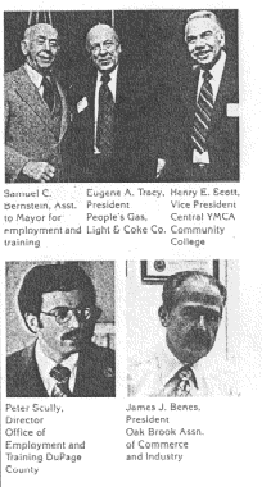 |
TRAINING INC.
401 N. Wabash, Suite 532 Chicago, Illinois 60611 312/5270276
2625 Butterfield Rd., Suite 304N OakBrook, Illinois 60521 312/3238510
Donated by McDonald's Corporation